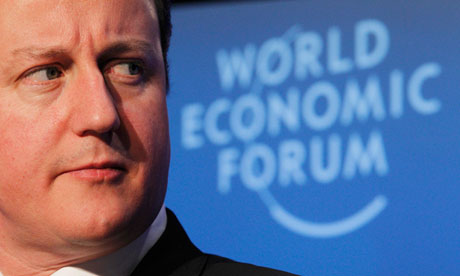It used to be economic heresy – but there's a rising wave of opinion that growth is really not sustainable
(With Transfinancial Economics the right short of growth is necessary to achieve change. See http://www.p2pfoundation.net/Transfinancial_Economics However, a stage may be reached when enough has been done to bring about enough social, economic, and political change in the world, and thus, greater, and greater growth becomes superfluous)

'Relentless focus on growth' ... David Cameron at Davos in 2010. Photograph: Christian Hartmann/Reuters
In orthodox economics, growth is good. At Davos this year, 35 sessions dealt with how to encourage more of it. "Relentless focus on growth," said David Cameron in 2010, "is what you will get from this government." The more money spent, the more money made – goes the argument – and the more money that can be spent again. By contrast, if people stop spending, firms stop making money, and their employees start losing their jobs. In short, growth defines progress.
To suggest otherwise, says economics professor Tim Jackson, was once "like arguing that you wanted to sell your grandmother". But in May 2011, the 2,500 delegates at Berlin's Beyond Growth conference did just that. Influenced by the likes of Herman Daly, conference-goers argued that growth was a useless way of achieving prosperity. Growth simply depends on economic activity – "and a lot of that activity," says one of the attendees, freelance economist Brian Davey, "isn't necessarily very useful".
Buying a gun contributes to growth, for example, but eventually it might also hurt someone. Buying petrol earns the vendor money, but depletes natural resources. As a result, growth can't go on for ever – the earth's resources are finite. Sustainable growth, they argue, is also a myth: it's impossible to decouple economic progress from environmental damage.
It wasn't just eco-warriors saying this: "There were some serious academics, NGOs, labour unions, Marxists, and also a lot of young, bright highly-motivated kids," remembers Jackson, author of Prosperity Without Growth, and one of the academics present. Over 100 speakers outlined alternatives to growth – tactics that aimed to slow down economic activity while raising employment and people's quality of life. Suggestions included various forms of decentralisation; turning private land into commons to avoid its overuse; and sharing full-time jobs between part-time workers.
"This heretical idea of a no-growth future – it's no longer just possible," says Kalle Lasn, editor of Adbusters magazine, and author of Meme Wars, an upcoming book about transcending growth. "It's being discussed in a very workmanlike way." In 2007, Tim Jackson felt he couldn't even "breathe the question. But what's interesting for me was that only three years later, thousands of people would turn out to ask exactly that question."
To suggest otherwise, says economics professor Tim Jackson, was once "like arguing that you wanted to sell your grandmother". But in May 2011, the 2,500 delegates at Berlin's Beyond Growth conference did just that. Influenced by the likes of Herman Daly, conference-goers argued that growth was a useless way of achieving prosperity. Growth simply depends on economic activity – "and a lot of that activity," says one of the attendees, freelance economist Brian Davey, "isn't necessarily very useful".
Buying a gun contributes to growth, for example, but eventually it might also hurt someone. Buying petrol earns the vendor money, but depletes natural resources. As a result, growth can't go on for ever – the earth's resources are finite. Sustainable growth, they argue, is also a myth: it's impossible to decouple economic progress from environmental damage.
It wasn't just eco-warriors saying this: "There were some serious academics, NGOs, labour unions, Marxists, and also a lot of young, bright highly-motivated kids," remembers Jackson, author of Prosperity Without Growth, and one of the academics present. Over 100 speakers outlined alternatives to growth – tactics that aimed to slow down economic activity while raising employment and people's quality of life. Suggestions included various forms of decentralisation; turning private land into commons to avoid its overuse; and sharing full-time jobs between part-time workers.
"This heretical idea of a no-growth future – it's no longer just possible," says Kalle Lasn, editor of Adbusters magazine, and author of Meme Wars, an upcoming book about transcending growth. "It's being discussed in a very workmanlike way." In 2007, Tim Jackson felt he couldn't even "breathe the question. But what's interesting for me was that only three years later, thousands of people would turn out to ask exactly that question."

No comments:
Post a Comment